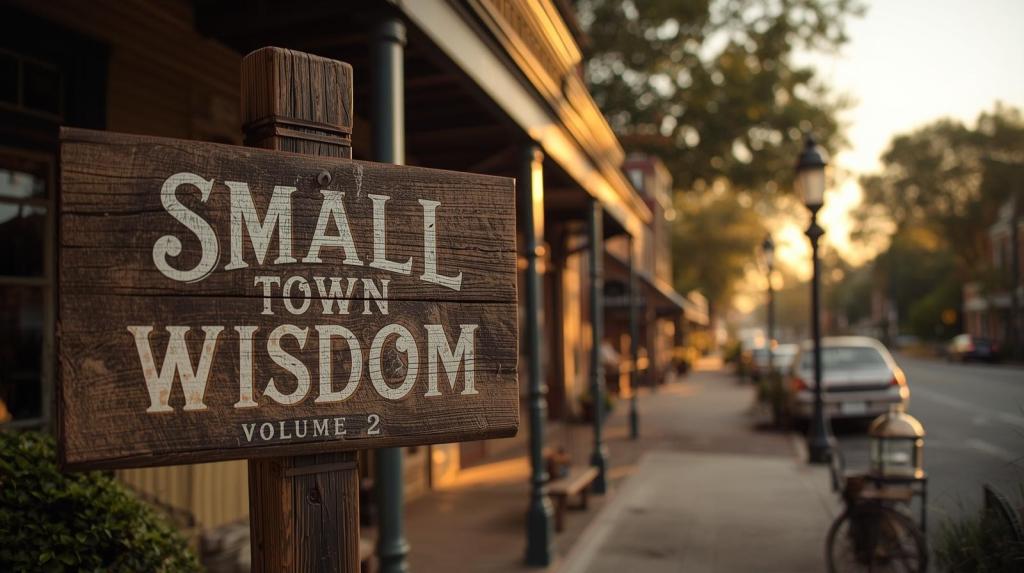
Small Town Wisdom Volume 2
Last week, as I noticed the corn changing colors and realized fall was here, I was immediately inspired and reflected on about eight things I had either learned or needed to unlearn, all of which were loosely related to life in small-town America.
(From the last episode) Our town has roughly 1,500 residents. We produce enough wind energy to power our mostly agricultural community, with some industry scattered throughout. It takes about 30 to 45 minutes to get to Walmart, depending on the route.
Small towns have their advantages and their challenges. So, I don’t think it’s wise to say dogmatically that one is better than the other. However, I do believe it’s important to learn from where you are.
So, let’s dive into it.
1. Your gravy isn’t all that special.
As a pastor, I often visited others’ homes to share meals with them and their families. It was one of the greatest joys in life, except that sometimes there was a lot of tension in the house. Although they didn’t want to talk about it, it still filled the room. But mostly, I just enjoyed eating good food and spending quality time with people.
At every house, there seemed to be a gravy maker—the person always authorized to make the gravy because theirs was “the best!” Often, on Thanksgiving, there was a designated stuffing maker, and someone always prepared the turkey. Interestingly, it was rarely that I tasted the gravy, stuffing, or even the turkey and thought, “Wow, that is the best I’ve ever tasted!” If I did, I wasn’t being sincere. It was edible, but nothing to write home about.
At this point, it’s important to take a reality check. Gravy isn’t that difficult to make, and it generally tastes the same no matter who makes it. If you’re not into cooking, there are even packets or jars you can mix with water or broth, making it even easier. I promise, it will be the “best” and probably better than Aunt Suzie’s. Just don’t tell them how you made it.
If you doubt how easy it is to make gravy, here’s the recipe:
- 2 cups of greasy broth (juice from turkey, vegetable broth & margarine, etc.)
- 4-6 TB flour or cornstarch (whisk vigorously for 30 seconds)
- Salt/Pepper/garlic (Bring to a boil, reduce heat, set on warm until ready to serve).
I often cook everything when people come over, which makes me wonder if my food is truly delicious or if others are just happy to have a free meal and avoid cooking. My mother-in-law brings desserts and sometimes fruit, not because she’s the best at it, but because she’s willing, and that saves me one less thing to do. The more we do it, naturally, the better we’ll get at it, especially if those who don’t want to cook give us honest feedback on how to improve.
The moral of the story is this: people’s compliments might be genuine, meant to boost your confidence and show gratitude, but they can also be used to manipulate you into doing things they don’t want to do.
3. Believe what you want but show me the truth.
I live in the “Show Me” state of Missouri. The phrase most likely came from a congressman, Willard Duncan Vandiver, who used it in a 1899 speech in Philadelphia. But regardless of where it started, it reflects some skepticism about what people claim they can do and what can actually be proven or demonstrated through actions.
In most cases, we’re comfortable with this phrase, no matter where we live. Even in Oklahoma, we would say when someone wanted to threaten us, “There’s nothing between me and you but common sense and air.” If this doesn’t make sense to you, it means “Don’t tell me, show me!”
But what about our beliefs that we hold so confidently, even when we rarely have proof or evidence? Beliefs are not facts! Beliefs are not actions that prove anything. As I have mentioned before, our beliefs are simply assumptions. I don’t really mind what you believe, as long as you don’t hurt others with your beliefs, but what would be much more helpful is for you to “Show me!”
We can’t prove that we believe loving our neighbor is best just by saying so or reciting it blindly; we must demonstrate it through our actions. If God exists, He doesn’t become real just by claiming He loves us. He must prove it through His deeds. Believing we should be kind only becomes a fact when we show it through our actions.
To God, and those who believe strongly, let me just close by saying something I learned to say in Oklahoma when people talked too much, “Talk’s Cheap!”
3. Don’t trust a guy who doesn’t have a dog.
I remember my first dogs, a pair named Duchess and Duke. I think the reason we had to get rid of them when they had puppies is that they were a pair. That’s my story, and I’m sticking to it.
My current dog, Winston, woke us up in the middle of the night, vomiting something he had eaten. We figured it might have been the questionable carrots. We ate the ones cooked at 325 degrees Fahrenheit, and his came straight from the refrigerator. This is probably why he was vomiting at 3:00 a.m. I felt bad but reassured myself with the questions, “How slimy is TOO slimy?” and “I didn’t know.” But the truth was that I had asked someone right before I used them, and I figured he could handle it, and ours would be okay because of cooking.
The middle of the night doesn’t bring out the best in any of us, but after a few minutes, we calmed our nerves and cleaned up the vomit. I decided to stay with him for the rest of the night and play my survival game on my phone. The good news was that he didn’t throw up again, and I felt like I was being more compassionate than I usually am.
I hope that means I’m growing, maturing, and healing because how we treat “the least of these” matters a lot. I respect my brother-in-law, Bart, because even though he doesn’t have a dog anymore, he lets out an “aww” every time he hears a story about someone being mistreated or suffering.
Whenever I complain to Winston about having to take him outside again to use the bathroom, he looks at me as if to say, “What do you expect me to do?” He gave me the same look when I complained about having to get up, right before he left some more carrot soup for me in the living room on the rug that I just shampooed the day before.
We can’t claim to be noble when we love only those who are the most lovable. We can’t claim to care about humanity if we don’t care about the most vulnerable members of society. We can’t sit in ivory towers and ignore the suffering of people in the gutter. And the person who abuses his animals will probably harm others around him.
Loving every one of our neighbors, including animals and those we often ignore, requires dedication, time, and effort.
4. We won’t impress people when we’re unreliable.
I tend to arrive early wherever I go because I dislike the feeling when something has already started and I show up even a minute or two late. Similar to the gravy story, I need to add my input, which breaks one of the rules from the last episode of this series because you didn’t ask for it. But since you’re still reading, I’ll take that as consent.
It’s important to understand that being consistently late signifies, at the very least, a few things that I hope we begin to recognize as we mature. People don’t respect us just because we’re busy. Instead, over time, we learn that managing our time well is a sign of responsibility. The person who seems to have plenty of time for what they’re doing often accomplishes more and does it quite effectively.
There are elementary courses that teach time management, focusing on planning what you have committed to the day before and recognizing time constraints during each activity. It requires effective communication, careful planning, and prioritization to manage time well.
I don’t respect people who claim to be busy. I admire effective people.
Be reliable. It’s a gift to others!
5. The best place to invest is at home.
I was distraught after I had my stroke a few years ago. I realized my new disability would make it difficult to travel to places like Ireland that I had always dreamed of visiting. Not only would I be less physically able to do some of those activities, but I also understood that my finances would be limited from now on unless something miraculous happens.
But I wasn’t sad for long because one of the things I’m fortunate to do is write in my office, which is at the back of my house. The window overlooks our garden, which did quite well this year now that we compost all our food. Beyond that, there’s a wall of trees, and it almost feels like I’m somewhere out in the woods in a little cabin.
The puzzles I’ve been assembling are now glued together and starting to cover the entire wall here. Each one reflects a focused activity, with scenes and characters I chose because they bring me joy. Between these puzzles, there are artworks from a friend and several of our children. Alongside the other wall hangings are my Dia de Los Muertos collectibles and all our certificates and degrees.
Yeah, it’s cluttered and a little dusty, but it’s home.
Most of the vacations I took were somewhat disappointing, mainly because of the travel involved and the energy and time it took to get there and back, despite moments of satisfaction and rest during our stay. As a child, I almost always got sick before we went on vacation. It’s a bit of a catch-22 now because I love to explore. Still, I have lost interest in travel, except for short trips between volunteering and visiting my grandchildren, or a trip to Omaha to a favorite restaurant.
It gave me almost as much satisfaction as traveling yesterday when I drove six blocks to the school to mentor a kid and start our next puzzle together. I enjoy it when my grandkids visit and stay overnight as much as traveling anywhere, so I can post pictures mainly on Facebook and make other people jealous.
Being present where we are makes all the difference. I believe traveling and exploring new places is wonderful because it offers a fresh perspective and exposes us to things we’ve never experienced before. This energizes and renews us, inspiring us to return home and dedicate as much time to being present as we once did in wishing to be somewhere else.
Maybe I’m lucky to have just enough money to support my living space, and I believe it’s a fitting metaphor for life that aligns with my purpose: Be where you are. Be who you are. Be at peace!
6. You’re Still Cool
My wife uses a classroom management method called Whole Brain Teaching. It employs various techniques to engage the entire brain, keeping students interested in learning at the same time. There are several guidelines and many different practices that make it effective, and she always maintains the most attentive and well-behaved classroom because of her effort to use this method.
One thing I appreciate about it is how they handle situations when kids make mistakes, answer incorrectly, or drop and spill something on the floor. They practice automatically responding to these moments with the phrase “You’re still cool.”
One reason this is helpful is that it reduces the chance of laughing out of discomfort with the situation. It also gives them something specific to say and reassures the people who spilled their lunch on the cafeteria floor that they are still okay, and it’s not the end of the world.
I don’t face these situations as often as I did in school, but I’m working on expressing myself more confidently. Like in a small town, we accept people with imperfections and forgive their mistakes because we have to live with them. We’ll see them again tomorrow or next week at the convenience store because there’s only one of them. We’ll probably run into them at the football game or see them when we go to vote.
This simple phrase and others like it can remind us that everyone makes mistakes, and we’re not judging you as harshly as you might be judging yourself.
You matter, you deserve to be heard, and you make mistakes, but you’re still cool!
Be where you are, be who you are, be at peace!
Karl Forehand
Is My Church a Cult? Part 1 of 2
Is My Church a Cult? Part 2 of 2

















